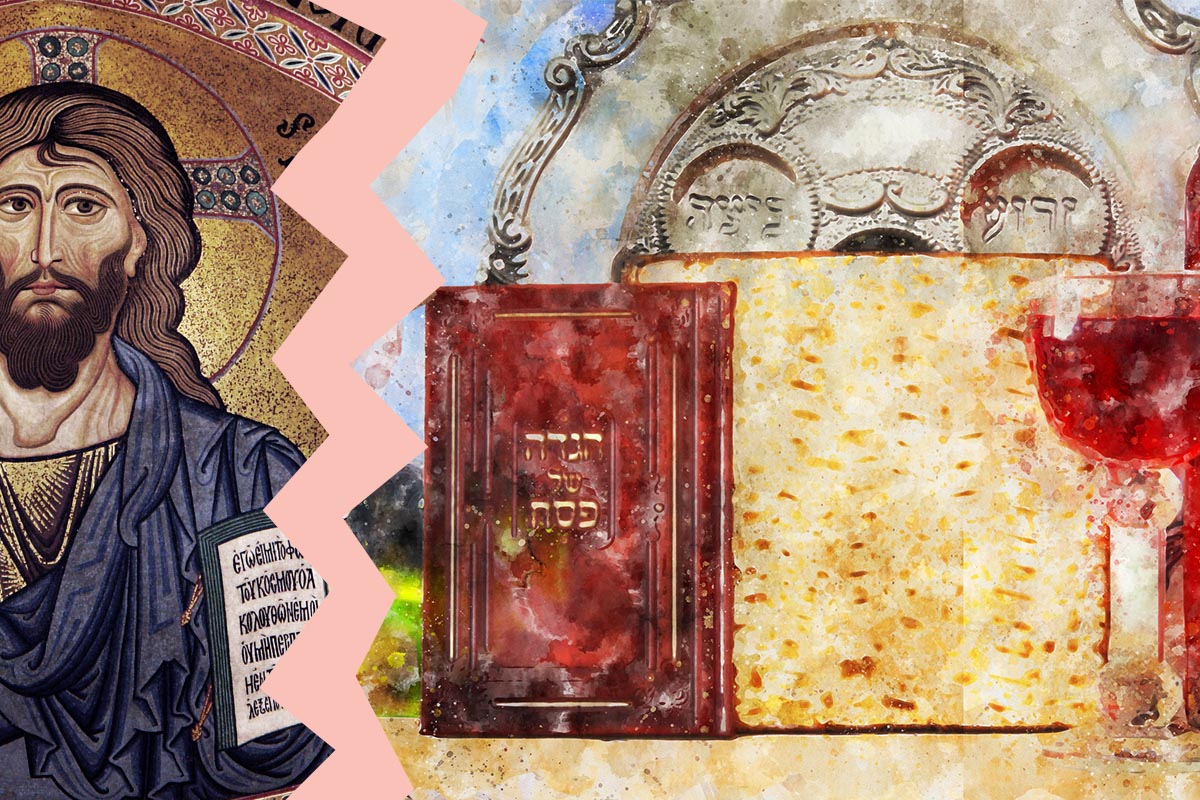Passover is just around the corner, which means people are starting to think about hosting a seder. (We have some tips on how to host your own seder.) If you’re me, the build-up to Passover means listening to The Prince of Egypt soundtrack (which is a certified JAM) on repeat. If you’re other people, that means talking about Christian seders.
Yes, you read that correctly: Christian seders.
Wait, what!?
It began with a tweet from Rabbi Danya Ruttenberg, who wrote, “Now that we’re getting closer to Passover and Easter, a reminder that Christian seders are appropriationisitc, problematic, and also not historically accurate. Don’t host them, don’t participate in them.”
She then linked to an article she wrote in The Washington Post last year entitled “Five myths about Passover.” (It’s a great read.)
Can Christians be invited to a Jew's home to be an invited guest at their (Jewish) seder? Sure. That's about however long you've been in real relationship with that person, to score an invite. BUT DO NOT HOLD A SEDER IF YOU ARE CHRISTIANS TRYING TO APPROPRIATE JEWISH TRADITION
— Rabbi Danya Ruttenberg (@TheRaDR) March 26, 2019
Her argument basically comes down to this: If you’re Christian, you can totally go to a Jewish person’s seder. But you shouldn’t host your own, because, well, you’re not Jewish.
As Rabbi Ruttenberg wrote in a subsequent tweet: “My beef is with Christian seders, Christian appropriation of Judaism. Not Jews & Jews-to-be & Jew-curious and Jew-adjacent folks and non-Jewish friends or participating in Judaism!! Come! Eat!”
What exactly are Christian seders?
Christian seders have become such a thing in recent years that the Wikipedia entry on the Passover seder has an entire section about Christian seders:
“Some Christians, especially but not only Evangelical Protestants, have recently taken great interest in performing seders according to the ancient rubric. Many churches host Seders, usually adding a Messianic Christian Passover message, and many times inviting Messianic Jews to lead and teach on it. Many Christians cite the meal as a way to connect with the heritage of their own religion and to see how the practices of the ancient world are still relevant to Christianity today.”
(Messianic Judaism, remember, is not a sect of Judaism. Messianic Jews are “Jews for Jesus,” like Chris Pratt once was. Related: Christian rabbis aren’t rabbis. Glad that’s cleared up.)
The logic behind the Christian seder is that many believe Jesus’s Last Supper was a Passover seder. So, they believe that since Jesus was celebrating Passover, they too should celebrate the holiday.
As Rabbi Ruttenberg explains, this is a myth. “The Gospels of Matthew, Mark and Luke assert that the Last Supper took place on the first night of Passover. As such, some Christians are attracted to contemporary observance; some churches even hold ‘Christian Seders’ in an attempt to practice the religion of Jesus.” Yet, as Rabbi Ruttenberg points out, “parts of the Seder might have begun to take root during Jesus’ lifetime, but there’s no evidence that they were widespread or developed enough that he would have participated in them.” The Seder ritual as Jews practice today did not exist at the time of Jesus.
Okay, so, why do Christians hold seders?
Rebecca Cynamon-Murphy wrote in April 2014, “Christians may desire to become more Christ-like or to develop deeper understanding of Christian roots.” She goes on to say that, “Christians celebrating their own Passover do unwitting harm to the Jewish people because they ignore centuries of persecution of Jews — and they do harm to themselves by ignoring their real-life Jewish neighbors, treating them as relics rather than people.” (Emphasis mine.)
“3,500 years of persecution, much of it by Christians, is not negated by the relative freedom from discrimination that Jews in America have experienced in recent decades,” Cynamon-Murphy writes. “The horrific fear that so many Jewish people have felt cannot be understated. From Easter traditions that involved hunting down Jews to pogroms to ghettos to the Spanish Inquisition to the Holocaust, history is rife with this violent legacy.”
When did the Christian Seder emerge??
You have World War II to thank for that! Seriously.
Christian interest in the Passover seder, as Rabbi Yehiel Poupko and Rabbi David Sandmel explain, “can be traced to the emergence of post-World War II Jewish-Christian dialogue, in which the ‘model Seder,’ led by a knowledgeable Jew, emerged as an opportunity to use the Passover/Easter connection to teach Christians about Judaism, but also because Christians wanted to better understand the Jewish background of their faith. But these well-intentioned goals were the victim of their own success.”
They continue, “so what began as an effort at interreligious and historical understanding morphed into a tradition for many churches’ Holy Week celebrations, so that in some settings the Seder has become a form of Christian worship.”
This has led to the concept of Christian Passover. No, really, that exists. Even googling “Christian seder” brings up a bevy of responses and how-to-guides for Christians:
There are various Christian organizations even advertising their Christian seders on social media.

Which, if this makes you, a Jewish person, feel uneasy, you’re not alone.
The reactions to Christian seders
After Rabbi Ruttenberg’s tweet went viral, conversation about Christian seders blew up on Twitter. Here are some tweets that get at the problematic nature of Christian Passover seders, in no particular order:
1. It’s exactly like if Jews started doing the Eucharist.
Most Christians would be really uncomfortable about another faith tradition holding a "Eucharist." And yet many Christians still don't see the problem with holding a "seder." Here's a great explanation of why that is problematic (if my simple example wasn't enough.) https://t.co/mfTfVKJUte
— Josephine Robertson (@crazywholelife) March 26, 2019
2. Don’t do it!
Christian friends, again this year as every year: do not host a Passover seder!
"What to do, then, if you are a Christian who wants to be more like Christ, as well as to learn more about your cultural roots? Practice restraint. … Don’t host a seder."https://t.co/tZgavNvpJ4
— Dr Mette Bundvad (@MetteBundvad) March 26, 2019
3. Awful stereotypes & appropriation!
Oh noooo is it time already for the “I’m catholic/whatever Christian denomination & I celebrate Passover by engaging in awful stereotypes and appropriation” tweets? Seriously, stop this nonsense.
— Hannah A. Brazeau (@HABrazeau) March 26, 2019
4. Just go to a Jewish friend’s seder!
If you are a non-Jewish (esp Christian) person interested in experiencing a seder for educational purposes, ask a Jewish friend of you can accompany them to theirs. But respect their answer and definitely don't create your own, or attend a church's seder!! https://t.co/qdiUnZpMWN
— Char Hersh (they/them) (@charliehersh) March 26, 2019
5. Interfaith seders are a great idea…
Cosigned. Holding an interfaith seder that is educational and focused on building community is a great idea- Christians holding their own seders, not so much. https://t.co/5nJb1OvI9l
— Sarahbeth Caplin (@SbethCaplin) March 26, 2019
6. “Someone else’s faith is not a tool for your religious warm-fuzzies.”
It is anti-Semitic.
Someone else's faith is not a tool for your religious warm-fuzzies.
Don't do it.
— John S – He/Him 🖖🏼🇺🇸🏴🇬🇧🇮🇪🇩🇪 (@Pr_JT_Sipf) March 26, 2019
7. And, as this tweeter pointed out, especially painful given the history of the blood libel (you can read more about that here).
It is especially painful given the history of Christians treatment of Jews both in general, and around Passover itself. The blood libel from the Catholic Church around Passover alone is enough to make you sick. Ever hear the bs about Matzah? And children? Yeah, Catholic Church.
— (((Keshet))) (@who_arewe_all) March 26, 2019
8. And on that note…
Catholics do not believe their faith is rooted in Judaism. They spent centuries denying Jesus was a Jew.
To go from “Jews use the blood of Christian kids in their matzoh” to “actually the Seder is ours too” isn’t respectful. It’s laughable. It’s dehumanising. It’s anti-Semitic.
— The Irish Atheist (@Irish_Atheist) March 26, 2019
Let’s end with one more tweet from Rabbi Ruttenberg:
Again: using a ritual that a) is not your own & b) evolved after Jesus' time while casting Jesus as the ultimate redeemer of it (!) is a) appropriation & b) perpetrates harmful supersessionist theology that has caused & justified Jewish oppression and murder for centuries.
— Rabbi Danya Ruttenberg (@TheRaDR) March 26, 2019
Jessica Price, an Alma contributor who was also tweeting about the controversy, explains the discomfort Jews feel succinctly: “Appropriating rabbinic Jewish practices doesn’t help you understand Jesus or his life or get closer to him, and using markers of modern Judaism to pretend to be practicing Old-Timey Christianity treats Judaism as a reified relic of the past, ignoring that this is the practice of living, breathing people, that Judaism is an evolving civilization, and that Jewish practice is meaningful and vital beyond its relationship to Christianity.
“However much Christians may think that they’re getting in touch with their roots by holding seders, or finding common ground with Judaism, functionally, it ends up being cosplaying Jews,” Price continues. “And other people’s cultures aren’t your costume. And it’s even more insulting to take one of the central formal expressions of Jewish peoplehood—that goes far beyond religion—and pervert its symbolism to proclaim the theology of a religion that’s spent most of the last 2000 years trying to make the Jewish people disappear.”
Oy. Okay. At least it’s just seders?
Unfortunately, it’s not. Christian co-opting of Jewish tradition extends to Shabbat, the High Holidays, and even ritual objects like mezuzahs. (Yep, Christian mezuzahs are a thing.) There’s even a website dedicated to this: hebrew4christians.com.
At the Jewish Telegraphic Agency, Ben Sales reported on a Christian movement called the Living Church of God, where its adherents “observe Christianity as they believe Jesus observed it: according to the dictates of the Hebrew Bible.”
Christian Jewish practice has become so much of a thing that searching for simple Jewish keywords on sites like Pinterest bring up Christian results. See here:
whyyyyyy is this the first result for shabbat on pinterest 🙄 pic.twitter.com/m10Dt2kpQR
— emily burack (@emburack) March 22, 2019
In conclusion…
Christian appropriation of Passover seders, and other Jewish holidays, is a very weird thing that very much exists. The more you know.



